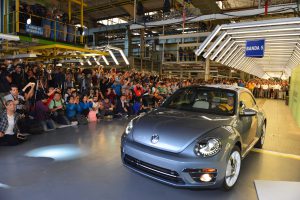
The last Beetle to roll off the production line.
After its multi-generational run as a brand mainstay and global automotive phenomenon, the Volkswagen Beetle is ending production.
The final car produced by Volkswagen de Mexico’s Puebla plant—a Stonewashed Blue coupe—will live on display at Volkswagen’s local museum in Puebla as a lasting tribute to the automobile’s rich and storied heritage.
Volkswagen de Mexico will soon shift resources to produce a North American market-focused compact SUV that fits in the manufacturer’s lineup below the VW Tiguan.
“It’s impossible to imagine where Volkswagen would be without the Beetle,” said Scott Keogh, president and CEO, Volkswagen Group of America. “From its first import in 1949 to today’s retro-inspired design, it has showcased our company’s ability to fit round pegs into square holes of the automotive industry. While its time has come, the role it has played in the evolution of our brand will be forever cherished.”
Introduced to America as the Type 1, Volkswagen sold nearly five-million Beetles in the United States, and a worldwide total of 21.5-million cars.
In 1998, the New Beetle—an early automotive adopter of “modern retro” design language—re-introduced the familiar silhouette to a new generation of drivers, and sold more than 1.2-million cars between 1998 and 2010.
In 2011, the third, and current generation of Beetle went on sale in the U.S. as a 2012 model and more than 500,000 have been built since.
Sold in both coupe and convertible variants, the second- and third-generation of Beetles have collectively been produced in 23 different exterior colors, 32 interior trims, 13 varying engine configurations and 19 special editions, including the Dune, Denim, Coast and #PinkBeetle.
All second- and third-generation Beetles have been built by Volkswagen de Mexico, Puebla and have been sold in 91 markets worldwide.
